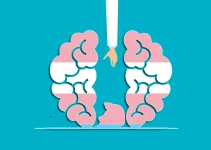Having mental health issues is a hard enough thing to deal with in this day and age. Better than in years past, yes, but a struggle to be sure. Finding a therapist that will deal with you, that you connect with, and that “understands” you is paramount to receiving good care for any patient in the mental health realm, but factor in a growing number of closing doors for trans patients, a normalization of misrepresenting and shaming trans people simply for being trans, and a fear from healthcare providers to treat trans people lest they have their funding cut, and suddenly the landscape, even for mental healthcare, looks radically different from the norm. Having to find a therapist the first time around, before trans was a scary word and everyone hated it, was hard enough. No one knew much about it, how to engage with someone who was trans, or what they might do to help a trans person talk through their experiences in a way that would be beneficial therapeutically. So it took several attempts to find someone, anyone, that could actually connect on any meaningful level, and this was a wonderful therapist who happened to be and older gay man who lived through the era where gay people were targeted and feared for all things, such as being presumed to be the cause of AIDS, that gay people were evil, that if a gay man looked at someone wrong they were trying to hit on that person and therefore should be confronted. He had been through it all. His lived experiences were able to relate to a trans person in a way that very few others could. He has been a continual source of education, comfort and enrichment for years at this point.
Sadly, however, positive stories in trans care are becoming more and more remote. As discrimination of trans people is becoming normalized and access to gender affirming care is diminishing, trans mental health is becoming more and more of a factor in today's world. When a 'passing' trans person lives their life, goes about their day and has no issues, their mental health tends to be relatively ok, they're living their life as the woman or man that they are, but when a trans person is harassed, denied healthcare, assaulted, or even passively discriminated against with things like mocking derision or deliberate misgendering, that can have a tremendous a devastating negative impact that compounds on the mental health of a trans person just is at would on anyone else. Given the hyper-focusing on trans people and the erosion of trans rights, it is becoming more important than ever to take into account mental health in the trans community as a part of the total gender-affirming package.
Unfortunately the hammer is falling hardest on trans youth at the moment, as ignorance and lack of understanding is stripping them of their right to gender-affirming care and decimating their mental health, leading to pervasive issues with depression and thoughts of suicide, but worse than this, feeling as though you cannot get the gender-affirming care you need from a doctor also makes you feel as though you cannot get or do not feel comfortable going to a doctor for any help because they don't respect you as the person, the human being you are. It creates trust issues, barriers, particularly for trans youth who don't necessarily understand that it isn't always the doctor or clinic's prerogative to remove gender-affirming care. The decision is often made by the politicians far above those doctors' pay grades and far beyond their clinic doors.
Political attacks on trans people are at their worst point, with it seemingly being normal behaviour to strip rights from trans people, to ban trans people from being in certain places, competing in certain events, and threatening doctors with felonies if they provide gender-affirming care to trans patients. Certain places are trying to define being trans as a disorder, as if being trans makes someone crazy. These constant attacks on trans identity also have a profound and horrific impact on the mental well-being of trans people, and work to diminish the mental health of trans people in all walks of life.
So what is the answer? How does the average person help to combat this level of ignorance, hatred and bombardment on trans mental health? There are many things you can do, whether you're trans or not, to help support trans people in navigating the mental health journey that comes with being trans in this current climate. First, just be there, be supportive and be an ally in a time when things are really, truly hard for trans people. You may never understand how much a simple "I'm here and I care about you" or an offer to sit down and talk things through could mean to someone struggling after a bombardment of hate and rejection. Second, educate yourself on what trans is, and try to educate others who maybe aren't sure of what trans is, either. It's something many people don't understand and therefore don't know how to feel about it. They have preconceptions, misconceptions or no conception at all. Education is the best tool to solve all of these issues. Learn what it is to be trans, why people transition, and what the process of transitioning actually entails. It isn't about putting on the clothes of the gender a trans person identifies as and proclaiming themselves that gender, it's far, far more than that. Finally, advocate for trans rights, you're needed out there! More and more voices are needed to help combat the hatred and ignorance that has run rampant for far too long, spreading miseducation, hatred and lies to strip trans rights and block access to healthcare. Help trans mental health by showing you care and fighting back on the front lines.
It's a long road ahead, but there is hope on the horizon. If, and only if, we work together.
Sadly, however, positive stories in trans care are becoming more and more remote. As discrimination of trans people is becoming normalized and access to gender affirming care is diminishing, trans mental health is becoming more and more of a factor in today's world. When a 'passing' trans person lives their life, goes about their day and has no issues, their mental health tends to be relatively ok, they're living their life as the woman or man that they are, but when a trans person is harassed, denied healthcare, assaulted, or even passively discriminated against with things like mocking derision or deliberate misgendering, that can have a tremendous a devastating negative impact that compounds on the mental health of a trans person just is at would on anyone else. Given the hyper-focusing on trans people and the erosion of trans rights, it is becoming more important than ever to take into account mental health in the trans community as a part of the total gender-affirming package.
Unfortunately the hammer is falling hardest on trans youth at the moment, as ignorance and lack of understanding is stripping them of their right to gender-affirming care and decimating their mental health, leading to pervasive issues with depression and thoughts of suicide, but worse than this, feeling as though you cannot get the gender-affirming care you need from a doctor also makes you feel as though you cannot get or do not feel comfortable going to a doctor for any help because they don't respect you as the person, the human being you are. It creates trust issues, barriers, particularly for trans youth who don't necessarily understand that it isn't always the doctor or clinic's prerogative to remove gender-affirming care. The decision is often made by the politicians far above those doctors' pay grades and far beyond their clinic doors.
Political attacks on trans people are at their worst point, with it seemingly being normal behaviour to strip rights from trans people, to ban trans people from being in certain places, competing in certain events, and threatening doctors with felonies if they provide gender-affirming care to trans patients. Certain places are trying to define being trans as a disorder, as if being trans makes someone crazy. These constant attacks on trans identity also have a profound and horrific impact on the mental well-being of trans people, and work to diminish the mental health of trans people in all walks of life.
So what is the answer? How does the average person help to combat this level of ignorance, hatred and bombardment on trans mental health? There are many things you can do, whether you're trans or not, to help support trans people in navigating the mental health journey that comes with being trans in this current climate. First, just be there, be supportive and be an ally in a time when things are really, truly hard for trans people. You may never understand how much a simple "I'm here and I care about you" or an offer to sit down and talk things through could mean to someone struggling after a bombardment of hate and rejection. Second, educate yourself on what trans is, and try to educate others who maybe aren't sure of what trans is, either. It's something many people don't understand and therefore don't know how to feel about it. They have preconceptions, misconceptions or no conception at all. Education is the best tool to solve all of these issues. Learn what it is to be trans, why people transition, and what the process of transitioning actually entails. It isn't about putting on the clothes of the gender a trans person identifies as and proclaiming themselves that gender, it's far, far more than that. Finally, advocate for trans rights, you're needed out there! More and more voices are needed to help combat the hatred and ignorance that has run rampant for far too long, spreading miseducation, hatred and lies to strip trans rights and block access to healthcare. Help trans mental health by showing you care and fighting back on the front lines.
It's a long road ahead, but there is hope on the horizon. If, and only if, we work together.


